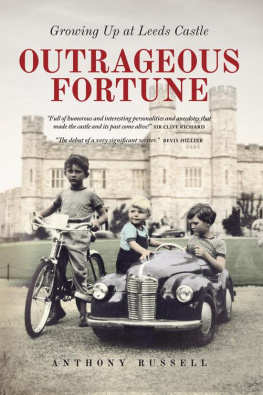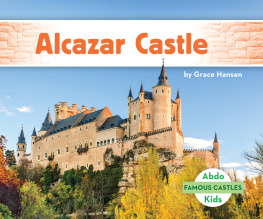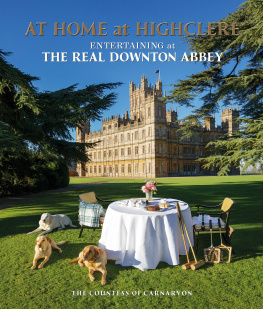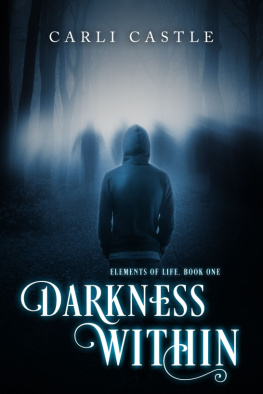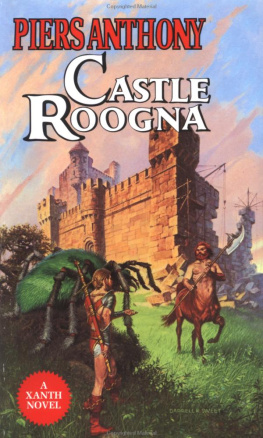1.
A V IEW FROM THE P RAM
M y two grandmothers, Granny A (Christabel, Lady Ampthill) and Granny B (The Hon. Olive, Lady Baillie) were remarkably unlike each other in practically every way except one: They each owned a castle. Whereas Granny Bs castle was rather large and had a moat and several thousand acres of park and farmland, Granny As was rather small and consisted mainly of a tower with a wall around it. Granny B employed fifty people on a full-time basis to keep her estate running smoothly. Granny A had a cleaning lady come in from the local village, Kinvara, twice a week. This is not to say that Dunguaire, Granny As castle, was in any way a lesser establishment than Leeds, Granny Bs. Just different.
Both castles possessed, to a certain degree, the look and personality of their (at the time) owners. Dunguaire, situated at the mouth of Galway Bay on the west coast of Ireland, was very pretty in a rugged, highly individualistic way. There was an air of defiance accompanied by a discreet layer of vulnerability in how she dominated her low-lying promontory, as if daring the world to mock her smallness in lieu of revelling in her charm.
Leeds Castle, deep in the heart of Kent, southeast England, was so exquisite and romantic and medieval and imposing (Granny B had exquisite taste and was certainly imposing but was neither romantic nor medieval) that I never cease to marvel at my good fortune to have spent so much of my childhood within the confines of its warm embrace, wandering , exploring, bicycling and go-carting up and down the castles mile-and-a-half-long front drive and three- quarter-mile -long park and back drives, which wended their way past woods and waterfalls, duck ponds and private golf course, a wood-garden, tennis court, grazing sheep, contented cows, horses, stables, garages, a petrol pump, the kitchen garden, greenhouses, laundry, an aviary, and the moat.
Wonderful in manifold glories, wrote the historian of castles, Lord Conway, are the great castle visions of Europe; Windsor from the Thames, Warwick or Ludlow from their riversides, Conway or Carnarvon from the sea, Amboise from the Loire, Aigues-Mortes from the lagoons, Carcassonne, Coucy, Falaise and Chteau Gaillardbeautiful as they are and crowned with praise, are not comparable in beauty with Leeds, beheld among the waters on an autumnal evening when the bracken is golden and there is a faint blue mist among the treesthe loveliest castle, as thus beheld, in the whole world.
The view from the pram, one of those handsome old shiny black models with giant wheels and a flying saucerlike compartment for me to lounge in, was equally sublime. From any angle, at any distance, the castle never failed to look anything other than awesome, swanky, huge, and gorgeous.
Growing up with Leeds as my second home, the other being my parents well-staffed five-storey house on Egerton Terrace, in Knightsbridge, London, had the less than desirable effect of effortlessly rendering me more spoiled than a Buckingham Palace corgi before I understood the meaning of the word.
Get out! Get out before I kick you out! I yelled, aged five, at the visiting Princess Djordjadze, a flamboyant, five-times -married (two English aristocrats, Douglas Fairbanks Sr., Clark Gable, and her Prince Dimitri of Georgia) former chorus-line-dancer Englishwoman (born Edith Louisa Sylvia Hawkes), one morning when she was making her entrance through the castle front door at the precise moment that Nanny and I were going out for a walk. Having taken an instant dislike to her bouffant hair, lynx coat, yapping Chihuahua, and air of self-importance, I felt my exalted position as a junior castle grand poobah justified such an outburst. (I actually astonished myself with this spur-of-the-moment public display of vehemence because the word most frequently used to describe me in those days was withdrawn.) This greeting passed immediately into castle folklore and provided endless amusement around my grandmothers afternoon canasta table (the card game was then much in vogue) when the Princess was far away.
One highborn guest, the Earl of Wilton, was asked by another, the Hon. Robin Warrender, at a castle dinner one evening in the 1960s, Is there anywhere, do you think, grander to stay than here? to which the Earl had apparently responded, Windsor!referring to the Queens 480,000-square-foot palace by the Thames in Berkshire. Under the circumstances it would have been difficult not to develop unworthy feelings of entitlement; after all, there was always someone to do everything for you. I never ran my bath, changed a bulb, cleaned my room, mowed a lawn, boiled an egg, washed up, fetched the newspapers, lit the fire, or helped at table. I was a catastrophically coddled boy brought up in monumental luxury , clueless as to where it might all be leading. Guidelines were never forthcoming from my parents or anyone else, in London or the country. Fortunately I had enough sense to refrain from passing on to others news concerning my important status in life. Due to my shyness, occasionally supplanted by fits of unusual boldness, I was in fact deeply inhibited, sometimes painfully so, in conveying my thoughts to most people on virtually any subject.
To this day I remain the slightly off-kilter product of my Leeds Castle childhood living. The power of its luxury brew (which came without any health and safety warnings on the side of the tin) went straight to my head as a child, and, despite the passage of time, a constant change of circumstances, and many years living in the United States, it has stayed forever warm in my mind.
I was born on May 10, 1952, four days after King Farouk of Egypt had himself pronounced a descendant of the prophet Muhammad and six months before Dwight Eisenhower was elected President of the United States of America. The importance of these developments escaped me at the time, but the killer smog that descended upon and tightly enveloped London between the fifth of December and the tenth did not. During those five horrible days the city came to a grinding halt; visibility was reduced to just a few feet, and old people, especially those with breathing problems, died in their thousands. The foul smoke, soot, and fog that seeped through every pore and crevice of our house on Egerton Terrace rendered it, and every other nook and cranny of Englands capital, a very disagreeable place, and at six months of age I contracted asthma.
One of the great benefits of being at deaths door as a baby is that one remains in blissful ignorance of ones impending demise. I have no recollection whatsoever of wheezing my way through 1953, and it wasnt until many years later that I learned how doctors of impeccable standing, in one hospital or another, had stood around muttering in hushed tones, I doubt hell make old bones. As it turned out, I was one of the lucky ones. Hundreds of babies and twelve thousand adults died as a direct result of the toxic darkness that suddenly and eerily appeared, and then, when the wind finally got up on the fifth and final day, dramatically departed, as in a horror film, but on this occasion, all too terrifyingly real.
At the earliest opportunity I was whisked off to the country , where the air was clean and I could breathe a little easier. By 1954 this is precisely what I was doing, my asthma having been so successfully treated that it went away for good. My early brush with mortality was then neatly filed away in the family archive of things not discussed. Years later, when I was eight and about to go away to boarding school for the first time, my mother made a passing reference to my illness. It really was touch and go

